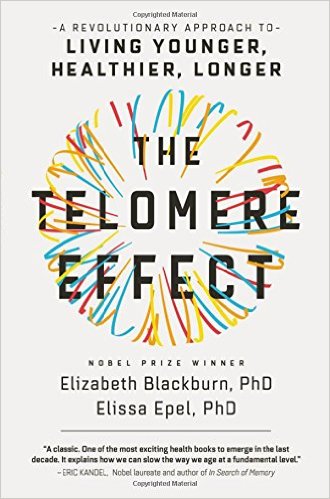Lincoln in the Bardo
by George Saunders
Published: Feb 2017
In a style reminiscent of Rosencrantz and Gildenstern are Dead / Waiting for Godot, George Saunders manages to make an extremely somber subject playful and light-hearted. The broken narrative structure can be unsettling at first, but once you get into the rhythm, it flows intuitively.
5 out of 5 stars: I know I am definitely not alone in my appreciation of Saunders' voice, I honestly think he could write about anything and still hook us in. Sidenote: apparently the audiobook has David Sedaris, Nick Offerman and George Saunders himself as the three main characters so that might be a fun way to revisit the story!
Sunday, June 25, 2017
Thursday, June 22, 2017
The Telomere Effect
The Telomere Effect: The New Science of Living Younger
by Elizabeth Blackburn, Elissa Epel
Published: Jan 2017
Telomeres are repeating nucleotide sequences hanging out on the tips of our chromosomes - they protect the chromosomes and deteriorate with each cell division (isn't aging a bitch?). But turns out the length of telomeres are also affected by a myriad of environmental factors: chronic stress, metabolism, sleep etc. Really was not expecting this to be a self-help style book but honestly, it was very refreshing to see all of the "tips" backed up by clinical research (and any advice was promptly followed up with varying degrees of assurance, depending on the evidence available). Plus it's pretty cool to read about telomere research from someone who literally won a Nobel Prize for her work in discovering them.
4 out of 5: In essence this is a data-heavy look into factors we may or may not be able to manage and how they affect the rate our cells age, but it's not like the advice itself is new. Drink water, eat raw foods, sleep a decent amount, don't be chronically stressed. Still, cliche or not, I enjoyed the delivery and the foundation of experiments.
by Elizabeth Blackburn, Elissa Epel
Published: Jan 2017
Telomeres are repeating nucleotide sequences hanging out on the tips of our chromosomes - they protect the chromosomes and deteriorate with each cell division (isn't aging a bitch?). But turns out the length of telomeres are also affected by a myriad of environmental factors: chronic stress, metabolism, sleep etc. Really was not expecting this to be a self-help style book but honestly, it was very refreshing to see all of the "tips" backed up by clinical research (and any advice was promptly followed up with varying degrees of assurance, depending on the evidence available). Plus it's pretty cool to read about telomere research from someone who literally won a Nobel Prize for her work in discovering them.
4 out of 5: In essence this is a data-heavy look into factors we may or may not be able to manage and how they affect the rate our cells age, but it's not like the advice itself is new. Drink water, eat raw foods, sleep a decent amount, don't be chronically stressed. Still, cliche or not, I enjoyed the delivery and the foundation of experiments.
Labels:
book review,
female writer,
nonfiction,
reading is fun,
science,
self-help
Wednesday, June 21, 2017
No Place to Hide
No Place to Hide: Edward Snowden, the NSA, and the U.S. Surveillance State
by Glenn Greenwald
Published: May 2014
Starts as a play-by-play of how Edward Snowden reached out to Glen Greenwald and all of the conversations leading up to the leak of classified documents, which is pretty fascinating in and of itself. We learn about Snowden's background, his motivations, and get to watch the behind the scenes bureaucracy of a world-renowed newspaper. Then Greenwald thoroughly breaks down the main points behind the documents and how they all fit into the context of an unrestrained mass surveillance machine. It's goddamn Orwellian. Greenwald also details the fallout from the leak, how corporate media demonizes whistleblowers and why subversion in journalism is so crucial to transparency.
4.5 out of 5 stars: The tone can be a bit dry at times, but I honestly think that was the less-than-ideal audio format (I needed something to listen to on walks!) because the narrator reads through each tedious part of the included documents including every "REL to USA, NO FORN" headers and every line of included tables.
by Glenn Greenwald
Published: May 2014
Starts as a play-by-play of how Edward Snowden reached out to Glen Greenwald and all of the conversations leading up to the leak of classified documents, which is pretty fascinating in and of itself. We learn about Snowden's background, his motivations, and get to watch the behind the scenes bureaucracy of a world-renowed newspaper. Then Greenwald thoroughly breaks down the main points behind the documents and how they all fit into the context of an unrestrained mass surveillance machine. It's goddamn Orwellian. Greenwald also details the fallout from the leak, how corporate media demonizes whistleblowers and why subversion in journalism is so crucial to transparency.
4.5 out of 5 stars: The tone can be a bit dry at times, but I honestly think that was the less-than-ideal audio format (I needed something to listen to on walks!) because the narrator reads through each tedious part of the included documents including every "REL to USA, NO FORN" headers and every line of included tables.
Labels:
book review,
journalism,
nonfiction,
reading is fun,
technology
Thursday, June 15, 2017
Lab Girl
Lab Girl
by Hope Jahren
Published: April 2016
Geobiologist Hope Jahren delivers a raw, unflinching memoir that explores her passion for science from eager child to award-winning researcher. Each life lesson is accompanied by an associated blurb on plant biology and growth so whether she's working in a hospital basement mixing drugs, digging through soil to learn about ancient climate change, or explaining how to use a mass spectrometer - her clever, self-deprecating anecdotes are as educating as they are moving. She is open about the harsh realities of being a woman in STEM academia but really bares her soul when it comes to the intersectional struggles of mental health treatment and pregnancy.
5 out of 5 stars: Powerful shit, man.
by Hope Jahren
Published: April 2016
Geobiologist Hope Jahren delivers a raw, unflinching memoir that explores her passion for science from eager child to award-winning researcher. Each life lesson is accompanied by an associated blurb on plant biology and growth so whether she's working in a hospital basement mixing drugs, digging through soil to learn about ancient climate change, or explaining how to use a mass spectrometer - her clever, self-deprecating anecdotes are as educating as they are moving. She is open about the harsh realities of being a woman in STEM academia but really bares her soul when it comes to the intersectional struggles of mental health treatment and pregnancy.
5 out of 5 stars: Powerful shit, man.
Labels:
book review,
female writer,
memoir,
nonfiction,
reading is fun,
science
Subscribe to:
Comments (Atom)









